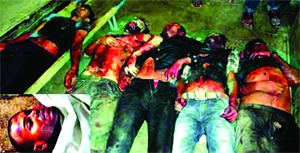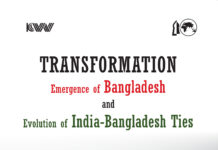Sadeq Khan
Sheikh Hasina’s third government in Bangladesh, formed without real contest by arranged results of January 5 elections boycotted by virtually all political parties other than the Awami League and its fellow travellers, is wallowing in celebrations by collecting ‘donations’ from banks and business houses. It spent crores in unproductive expenditure for a “befitting” opening of T20 World Cup Cricket series in Dhaka.
The Indian Maestro AR Rahman was contracted to conduct the opening musical extravaganza. The mystique of his usual creativity appeared to the Bangladeshi audience as missing in that show.
Some said it was more like a poor imitation of late Michael Jackson’s post-modern performance degraded in Bollywood style loud exhibitionism. The songs were in north Indian tongue and there was no courtesy inclusion of even one Bangla song or dance.
Record making song
Then spending multi-crores again, Sheikh Hasina’s third government arranged to set a new world record as over 2.5 lakh people sang the National anthem in chorus celebrating the 43rd anniversary of Independence Day at the National Parade Ground in the city. Sheikh Hasina herself joined the programme titled Lakho Konthe Sonar Bangla along with her ministers and lawmakers. The organisers, cultural affairs ministry and the Armed Forces Division targeted to mobilise at least three lakh people to lend their voice to the choir singing of the National anthem to surpass last year’s Indian record that saw 121,653 people. The 4km parade square was divided into 15 sectors to accommodate the participants, and the headcount by counting machines was strictly monitored by Guinness record officials through video cameras. Each participant was given a pack of dry food, medicine and a miniature national flag and a cap.
Doctrinaires of the ruling coterie used the occasion to step up anti-Jamaat propaganda by pressing the government to refund donation it collected from Islami Bank, supposed to be dominated by Jamaat-minded people and also by raising objection against medicine supplies by an Islamic hospital: “The government rejected the donation of the Islami Bank but Ibn Sina Pharmaceutical Company distributed paracetamol, anti-acid tablets and oral saline packs. This is company of the same group Islami Bank belongs to. This is absolutely objectionable.” But such propaganda enthusiasts notwithstanding, all was not well in that programme. Dhaka University girl students who were sent early morning by bus to the parade ground by the University administration, promising them full security, food and personal care on the spot, complained that many of them could not get the promised package of food, medicine etc. and were exhausted by the ordeal. Same fell ill. On their way back, they were teased and manhandled by unruly people in the crowd. The girl-students staged a fierce protest that night in Kuwait Friendship Hall against callous authorities.
Pressure for righting wrong
Meanwhile western pressure is also weighing heavily on the government for righting the wrong that was done to voters’ rights in January 5 polls, held avowedly under constitutional compulsion. The US Ambassador in Bangladesh and back on leave in USA has been hammering on the need for a fresh general election to audiences in Bangladesh as well as to Bangladeshi expatriates in America. The US Congress, had by a hearing and by resolution given him that mandate. Following a similar resolution in the European parliament, a four-member team led by Jean Lambert, chairperson of the parliamentary delegation for relations with South Asia, flew in on March 24, to follow up on the issue in Dhaka. This was the first visit by a high-level delegation from the EU since the January 5 elections in Bangladesh.
The European delegation after its two-day visit urged the two major political parties to engage in dialogue to find a way forward for giving the Bangladeshi people a chance to exercise their democratic right to choose in a “fully representative way”. It also voiced concern over the current situation resulting from the January 5 elections and the reported incidents of “violence and vote rigging” in recent upazila elections. The delegation called for “a full investigation of the disruption to polling” in the upozilla polls, and for a “reinforcement of the independence” of the Election Commission, to which the European Union contributed €10 million over the past few years.
The delegation particularly urged the government to ensure space for the civil society and maintain freedom of expression, notably by amending the Information and Communication Technology Act, “which it is feared could lead to the arbitrary criminalisation of citizens”. Concerned at reports of attacks on minorities, extrajudicial killings and forced disappearances, it called upon the government to fully investigate these reports, effectively implement its “zero-tolerance” policy on police abuse, and extend an invitation to the UN Special Rapporteurs on torture and extrajudicial executions.
HR abusing case in ICC
The nicely nicely tone of such diplomatic pressures may or may not disturb the complacence of the strong-willed Prime Minister. But an initiative by a group of internationally acclaimed lawyers acting under the name of “International Coalition for Freedom and Rights” may be posing a threat too pestilential to ignore.
On 4 February 2014, a ‘Communication’ was filed with the Prosecutor of the International Criminal Court (“ICC”) in The Hague to open a preliminary inquiry into complaints of crimes against humanity in the People’s Republic of Bangladesh. A team of lawyers from the International Coalition for Freedoms and Rights (ICFR) filed the complaints with the public prosecutor of the International Criminal Court over human rights violations in Bangladesh, accusing the Bangladesh government of committing crimes against humanity targeting Bangladeshi civilians. The team of lawyers representing ICFR filed the complaint along with documents that prove the perpetration of extrajudicial killings during the contentious elections held in January.
The team also submitted that the trial of the Islamic leader Delwar Hossain Sayeedi, sentenced to death by a Bangladeshi tribunal, was fraught with legal and human rights abuses, and quoted the international NGO Human Rights Watch voicing concerns that Bangladesh is “spiralling into a human rights crisis.”
The Attorney General of Bangladesh, Mahbubey Alam, dismissed the matter by his response that there was no legal scope to file such a petition. On 20 February 2014, the ICC Prosecutor responded by officially registering the Communication and will now consider the filing and supporting evidence in detail to determine whether to open a preliminary inquiry. The Attorney General’s position appears to have been ignored by the ICC prosecutor Fatou Bensouda. The petition by the International Coalition for Freedom and Rights for an investigation into the situation in Bangladesh, concerning mass extrajudicial killing, torture and brutality is supported by some of the most respected international jurists, from Lord Carlile QC the British Government’s adviser on counter-terrorism to Sir Desmond de Silva QC, the former Chief Prosecutor at the Special Court for Sierra Leone and the former ICTY Prosecutor Sir Geoffrey Nice QC.
Disturbing evidence noted
The petition claims that evidence of crimes against humanity having been committed by the Bangladesh Security Forces is highly compelling. From witness accounts to the testimony of relatives, to photographic evidence and video footage there is detailed and deeply disturbing evidence of the systematic repression, torture, murder and forced disappearance of those who support opposition parties and whose views differ from that of the current Regime. Since she came to power in 2009, Prime Minister Sheikh Hasina and her government have attempted to cripple opposition to her rule through a combination of legal and physical means. This took a brutal turn in 2013 with credible allegations emerging of several hundred deaths at the hands of the Security Forces.
Three intense periods in particular have been identified by the petitioners in 2013. The first incident the ICC ‘Communication’ considers is from 28 February 2013 when protesters demonstrated against a death sentence handed down to an opposition politician accused of war crimes during Bangladesh’s War of Liberation in 1971. The Tribunal that handed down this sentence was repeatedly found to be in breach of international law and was mired in allegations of corruption and judicial misconduct. Yet, despite these allegations, it managed to secure its first execution on 12 December 2013.
Then, the petitioners note that early May 2013 protesters, in support of an ultra-conservative Islamic group were forcibly dispersed from the capital’s commercial district. Many hundreds were believed to have been killed. The event has been described as a “massacre” by some sectors of the international media, and leaders of a local human rights group Odhikar which offered testimony to the media were arrested.
Finally the ‘Communication’ noted the state violence perpetrated against supporters of the opposition during the highly disputed election on 5 January 2014, which the opposition boycotted. Opposition leaders have been arrested, several have died in custody and in one incident, an opposition member was dragged from his house during the night and shot on the rooftop of his home by security forces. The government tried to explain the deaths of so many opposition supporters as ‘crossfire’ and as ‘unintended’ during raids by security forces on perceived ‘terrorist’ organisations.
ICC’s power to investigate
The petitioners quoted “independent observers” who attribute many of these deaths to deliberate killings by government forces of individuals already in custody. The ‘Communication’ also mentioned that Human Rights Watch has been charged with contempt by Bangladesh for criticising the conduct of the trials.
The ‘Communication’ pointed out that despite numerous requests the Government of Bangladesh has failed to investigate or prosecute any individuals bearing responsibility for these crimes. It is therefore imperative for the ICC as a court of last resort that has the powers to investigate and prosecute when a country is unwilling to do so to begin an investigation into the Bangladeshi Government, starting with its leadership.
Toby M. Cadman, who was a legal consultant with the Office of the High Representative for Bosnia and Herzegovina, and is now assigned to the European Union Police Mission there on matters of organised crime, had the following comment to make in Huffington Post on the ‘Communication’ over Bangladesh pending with the ICC:
“It of course falls on the discretion of the ICC Prosecutor who she prosecutes. The Communication sets out that cabinet members responsible for law and security, the Police Commissioner, Director of the Rapid Action Battalion and the Border Guards Bangladesh were persons exercising control over the political and police action. However, heading as she does the Ministries of Home, Foreign Affairs and Defence, as well as the Office of Prime Minister, there is no one who can be considered more culpable in the Government’s actions than Sheikh Hasina Wazed herself.
Even government advisers may have a case to answer, including the Prime Minister’s son, Sajeeb Ahmed Wazed. In his position as a Government adviser he issued a public statement in December calling for members of the opposition Islamist political party to be ‘wiped out’. In the days following the statement dozens of members of the opposition were killed. On 5 January 2014 alone at least 21 civilians were killed. It will be for the ICC Prosecutor to now to determine whether there is a sufficient connection between Wazed’s call for a political party to be ‘wiped out’ and the deaths that followed to bring criminal charges against him.”
Source: Weekly Holiday











This government is showing every sign of Nazi fascism – on the one hand it is whipping up vacuous and so-called Bangali nationalism and on the other, quashing all forms of opposition by application of brutal force and where necessary, by taking recourse to a controlled judiciary, duly endorsed by a pliant and opportunistic civil society and a part of media